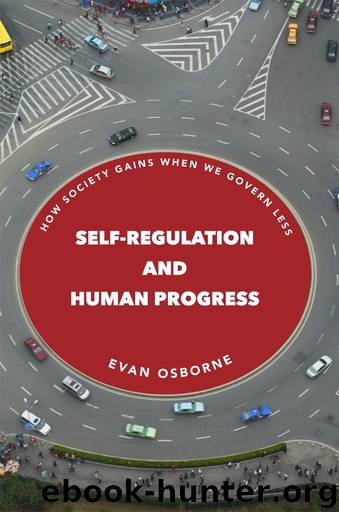Self-Regulation and Human Progress by Osborne Evan

Author:Osborne, Evan [Osborne, Evan]
Language: eng
Format: epub
ISBN: 9781503604247
Publisher: Stanford University Press
Published: 2017-01-15T07:00:00+00:00
CHAPTER 7
Rebuilding
Systemic Changes to Counter Self-Regulation’s Flaws
God works through the State in carrying out His purposes more universally than through any other institution.1
RICHARD T. ELY (1854–1943)
By the late nineteenth century, after a period of confidence in the discovered principle of socioeconomic self-regulation, its strength was increasingly doubted. Initially this doubt took the form of using politics to adjust the socioeconomy in a more favorable direction. But by the dawn of the twentieth century, the society sculpted by self-regulating forces had come to be doubted in a more fundamental way, which required rebuilding it.
The objections had the common feature that people, as the experimenters and evaluators at the heart of all self-regulating processes, were inadequate to these tasks. Throughout the rise of self-regulating thinking, many had thought that as long as the state truly reflected the general view or even the majority interest (neither of which it should be assumed to do), then it could, as needed, justifiably supersede the individual plans made by various socioeconomic agents. But the argument that people should not always be allowed to act on behalf of their individual interest now became that they cannot do so. This can happen, thinkers of the last century and a half have assured us, because they are helpless driftwood cast about by the social tides, mere atoms subject to the scientific laws governing not individuals themselves but the society composed of them. Alternatively, their cognitive capacities are simply not up to the task. Under either of these conditions, a Kantian moral agent capable of acting on his interests is a myth, and building a society around such a myth is a mistake, if not a crime.
DETERMINISM: HOW HISTORY IS NOT MADE
Lamentably if predictably, people—especially people of the first school, who saw history as the sweep of grand social forces and not the results of individual decisions—now argued that the state, if placed in the hands of the right people, could overcome these intrinsic weaknesses and forcibly rebuild society for the better. One of the earliest, most influential, and certainly most notorious examples of this kind of thinking was published in 1867 under the innocuous-sounding title (translated into English) of Capital: Critique of Political Economy.
Marxist Determinism
Karl Marx and Friedrich Engels (1820–1895) were both born in post-Napoleonic Prussia at a time when belief in self-regulating economic liberalism was ascending throughout Europe. In their youth, they witnessed the spread and growth of industrial society, and the rise of the associated social instability, including the tumultuous events of 1848. As young men in the late 1830s, they became enamored of Hegel, Marx at the University of Berlin and Engels while working joylessly as an unpaid clerk at a Manchester cotton mill owned by his father. Marx and Engels did not meet until 1844 in Paris, although while working at a radical newspaper in Paris, Marx first came to admire Engels’s writings on the working conditions in Manchester factories.
The two nineteenth-century men would go on to lay the intellectual foundation for changing the history of the twentieth century.
Download
This site does not store any files on its server. We only index and link to content provided by other sites. Please contact the content providers to delete copyright contents if any and email us, we'll remove relevant links or contents immediately.
International Integration of the Brazilian Economy by Elias C. Grivoyannis(106924)
The Radium Girls by Kate Moore(12000)
Turbulence by E. J. Noyes(8001)
Nudge - Improving Decisions about Health, Wealth, and Happiness by Thaler Sunstein(7676)
The Black Swan by Nassim Nicholas Taleb(7085)
Rich Dad Poor Dad by Robert T. Kiyosaki(6568)
Pioneering Portfolio Management by David F. Swensen(6267)
Man-made Catastrophes and Risk Information Concealment by Dmitry Chernov & Didier Sornette(5977)
Zero to One by Peter Thiel(5759)
Secrecy World by Jake Bernstein(4724)
Millionaire: The Philanderer, Gambler, and Duelist Who Invented Modern Finance by Janet Gleeson(4441)
The Age of Surveillance Capitalism by Shoshana Zuboff(4264)
Skin in the Game by Nassim Nicholas Taleb(4223)
The Money Culture by Michael Lewis(4167)
Bullshit Jobs by David Graeber(4161)
Skin in the Game: Hidden Asymmetries in Daily Life by Nassim Nicholas Taleb(3972)
The Dhandho Investor by Mohnish Pabrai(3739)
The Wisdom of Finance by Mihir Desai(3714)
Blockchain Basics by Daniel Drescher(3564)
